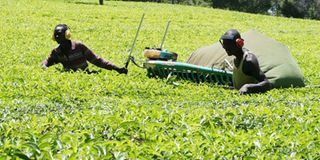BBC tea exposé: Lobbies want main culprit out of board elections

Workers operate a tea picking machine on one of the privately owned tea farms in Kericho.
What you need to know:
- John Chebochok is contesting an election on June 28, as regional director of the Kenya Tea Development Agency.
- He and other managers were filmed by BBC's Africa Eye and Panorama programmes, exploiting female workers in exchange for contract extensions and better working conditions.
A contractor at the centre of a BBC investigative report exposing the sexual exploitation of women working on tea plantations in Kericho has been allowed to contest in an election for a key tea agency, causing an uproar among Kenyan women leaders, rights activists, and international tea lobby groups.
John Chebochok, who was sacked by James Finlays Kenya (now Browns) in February 2023 is contesting an election on June 28, as regional director of the Kenya Tea Development Agency (KTDA). KTDA is a private entity with over 600 smallholder farms in 16 tea-growing counties in Kenya.
Chebochok and other managers were filmed by BBC's Africa Eye and Panorama programmes in February last year, exploiting female workers in exchange for contract extensions and better working conditions. The programme included detailed testimonies of sexual exploitation by workers, as well as undercover footage implicating Chebochok as a key perpetrator.
After the programme aired, Finlays said it had fired Chebochok and others and banned them from its tea estates. It also reported the suspects to the police for investigation, but so far, no prosecutions have taken place.
Now pressure groups, led by Kenya women parliamentarians, have come out to protest against Chebochok's candidacy, saying that allowing him to contest in the KTDA director elections is an injustice to his victims.
"We are expressing grave concerns about Chebochok's candidacy," said Leah Sankaire, chair of the Kenya Women Parliamentarians Association.
Given the nature of the allegations against him, she said it was imperative that his suitability be scrutinised.
“Electing him to this position will pose a risk to his juniors, especially women workers, who may be vulnerable to further exploitation under his leadership,” she said.
The Coalition Against Sexual Violence, a lobby group of 13 human rights organisations in Kenya jointly said Chebochok's candidacy was “a grave injustice to the courageous survivors of sexual violence who have come forward to hold him to account.”
The potential election of this individual, the group said, poses a reputational risk to Kenya's tea sector.
“We have already seen managers dismissed for similar offences rehired by other tea companies, perpetuating a culture of impunity and discouraging victims from speaking out about their abuses," they said.
UK-based Ethical Trading Initiative (ETI), a leading alliance of trade unions, NGOs and companies working together to promote human rights in global supply chains, also condemned his candidacy and called for Chebochok's removal from the election process.
“His candidacy undermines the work of concerned stakeholders across the Kenyan tea industry to address the endemic sexual exploitation and gender-based violence that too many workers face," ETI said in a statement.
Ethical Tea Partnership, another UK-headquartered tea lobby group, said it had written to Kenya's electoral body, the KTDA, and the Tea Board of Kenya to express its concerns about Chebochok's candidacy.
“We call for swift and clear action to ensure that apparent perpetrators of sexual exploitation, abuse and harassment are not employed in positions where they can continue to facilitate physical and economic exploitation and abuse," the lobby said.
Kenya's electoral body, the Independent Electoral and Boundaries Commission (IEBC), is expected to hold elections for directors of the 54 smallholder tea estates managed by the KTDA.
According to KTDA, eligible candidates for the directorship must, among other requirements, have an Ethics and Anti-Corruption Commission (EACC) clearance and a valid police clearance certificate.
The police clearance certificate is issued by the Directorate of Criminal Investigation (DCI) to those who have no pending criminal investigations or convictions. The EACC certificate is also issued to those who do not have any questionable ethical and/or corruption background.





